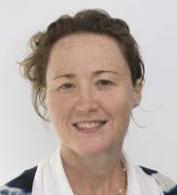The personal and emotive subject of why women stop breastfeeding and what they go through is the focus of a unique exhibition at Hobart’s Plimsoll Gallery .
The Broken Bodies exhibition is based on research led by Dr Jennifer Ayton (pictured) from the University of Tasmania’s School of Medicine (Public Health), and her desire to share her research with the community in a very different way.
Aimed at giving a voice to women’s complex, personal breastfeeding journeys, Broken Bodies is a collaboration between the University’s School of Creative Arts, Institute for the Study of Social Change and School of Social Sciences, as well as the Plimsoll Gallery and local and interstate artists.
The exhibition uses a combination of audio, podcast and ceramics to demonstrate the research outcomes – with one of the features being a giant teardrop of ceramic breasts representing the women who took part, individualised in shape to represent their stories.
Dr Ayton said statistics show only 1-2 per cent of infants are exclusively breastfeed up to the recommended six months in developed countries.
In Australia, few infants aged less than six months are exclusively breastfed, with half of those who start at birth stopping in the first two months.
The Broken Bodies project reinterprets more than 120 Tasmanian mothers’ breastfeeding narratives collected as part of the TAS Infant Feeding Study (2012), into expressive art forms, each responding to the women’s powerful experiences.
Dr Ayton said the
main findings of the research were that women across the age and social
spectrum highly valued and wanted to breastfeed. However, they also carried
with them a tremendous amount of grief and personal failure around not doing
something perceived as ‘natural’.
The research also
found there was a range of contributing factors to the cessation of exclusive
breastfeeding, including:
• bad experiences in
hospital
• lack of knowledge
• physical issues
such as mastitis
• perception of a
lack of, or too much milk
• baby not feeding
well
• feeling isolated
• conflicting advice
from health professionals
• criticisms from
family, health professionals and the general public
• not feeling safe
to feed in public
• returning to work.
Overall mothers did not want to stop exclusive breastfeeding, they felt disconnected from their bodies and experienced long-lasting confusion about their experience.
While many of the women’s stories were confronting and difficult to listen to, Dr Ayton said she was honoured to be able to return those stories to the community.
She said she hoped the exhibition would generate a critical conversation around where breastfeeding fits into the changing social and cultural landscape of mothering and parenting today.
“This is a very exciting project,” Dr Ayton said. “The most beautiful thing about using creative arts to translate research in this way is that it takes away any judgment and invites people to interpret the narrative on their own.
This project is about generating a conversation through which we can perhaps change the way we as a society think about what we do to support breastfeeding, what we do to help families, and how women across the age spectrum negotiate their bodies - particularly during motherhood.
The exhibition runs until 30 November.
Make a difference. Apply now to become a research student.
